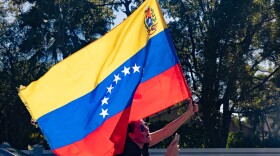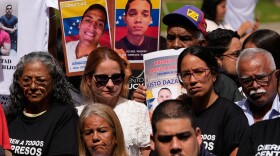
Tim Padgett
Americas EditorTim Padgett is the Americas Editor for WLRN, covering Latin America, the Caribbean and their key relationship with South Florida.
Padgett has reported on Latin America for more than 35 years — including for Newsweek as its Mexico City bureau chief and for Time as its Latin America and Miami bureau chief — and he has interviewed more than 20 heads of state, from Mexico to Brazil.
In 2005, Padgett received Columbia University’s Maria Moors Cabot Prize for his body of work in Latin America. In 2016 he won a national Edward R. Murrow award for the radio series "The Migration Maze," about the brutal causes of — and potential solutions to — Central American migration.
Padgett is an Indiana native and a graduate of Wabash College. He received a master's degree in journalism from Northwestern University's Medill School and studied in Caracas, Venezuela, at the Universidad Católica Andrés Bello. He has been an adult literacy volunteer and is a member of the Catholic poverty aid organization St. Vincent de Paul.
Contact Tim at tpadgett@wlrnnews.org
-
COMMENTARY As the U.S. cuts off oil to Cuba, Havana's communist regime and Miami's exile leadership remain locked in a zero-sum mindset that risks greater humanitarian catastrophe on the island.
-
Recently retired CBS4 news anchorman Eliott Rodriguez told WLRN "I am seriously considering" a Democratic challenge for GOP Miami Congresswoman María Elvira Salazar's seat this year — and immigration is a key reason.
-
Fellow Puerto Ricans say reggaeton superstar Bad Bunny's Super Bowl halftime show was a lush tribute to their island — and to the Latino community in general, at a moment when it feels like a special target of U.S. discrimination.
-
COMMENTARY As the U.S. cuts off global oil to Cuba, the island's communist regime could get President Trump to back off by offering something he's showing special interest in: dictatorship consulting.
-
For now, a federal judge's 11th-hour ruling blocks President Trump from ending Temporary Protected Status (TPS) for more than 350,000 Haitians — but he looks determined to assure their deportation back to gang-ravaged Haiti.
-
COMMENTARY It makes sense President Trump considers Homeland Security Secretary Kristi Noem and Venezuelan dictator Delcy Rodríguez "terrific." Both exalt the sort of lying and cruelty he does.
-
South Florida exiles applaud Trump for removing Venezuela's dictator, but they're less sure about whether he intends to remove Venezuela's dictatorship — or simply extract its oil.
-
COMMENTARY President Trump may be following a brazen and brutish version of the Monroe Doctrine on issues like Greenland — but the world shouldn't be shocked that it still lingers in U.S. policy.
-
COMMENTARY With no conquest booty like oil to distract him, President Trump could focus the capture of gang leaders in Haiti on rescuing the country's republic — and win his Nobel Peace Prize.
-
A new survey of Venezuelans inside Venezuela indicates that while they applaud President Trump's ouster of their dictator, they think he's more interested in their oil — and they strongly disagree with him about María Corina Machado.
-
People close to Venezuelan opposition leader María Corina Machado's political team say the Nobel Peace Prize winner is considering a visit to the diaspora in Miami after she meets Thursday with President Trump — who this month disparaged her prospects of governing Venezuela.
-
COMMENTARY President Trump's "law enforcement" capture of Venezuela's dictator will be regarded a failure if it doesn't mean democracy restoration — which may require more U.S. military force.












